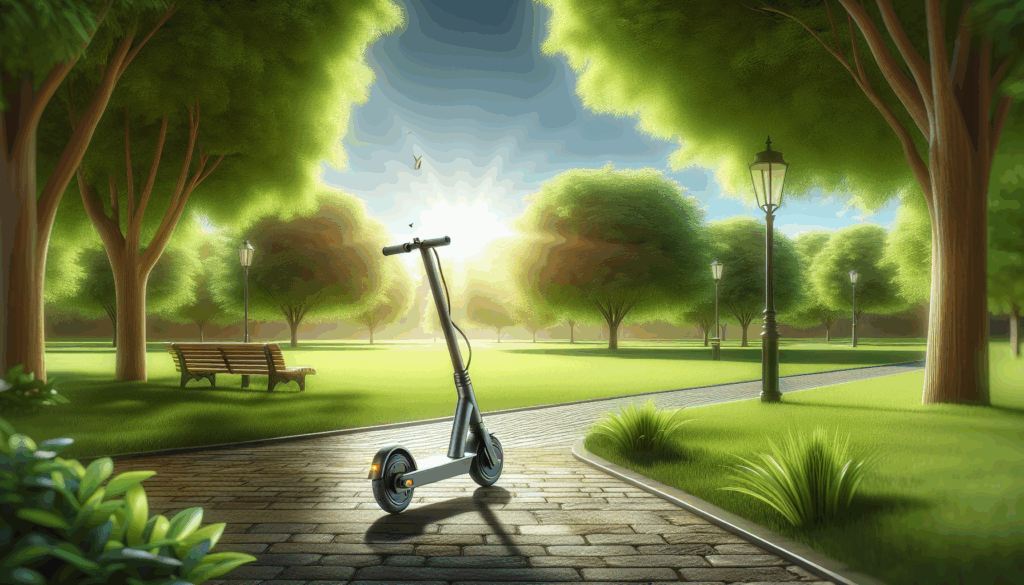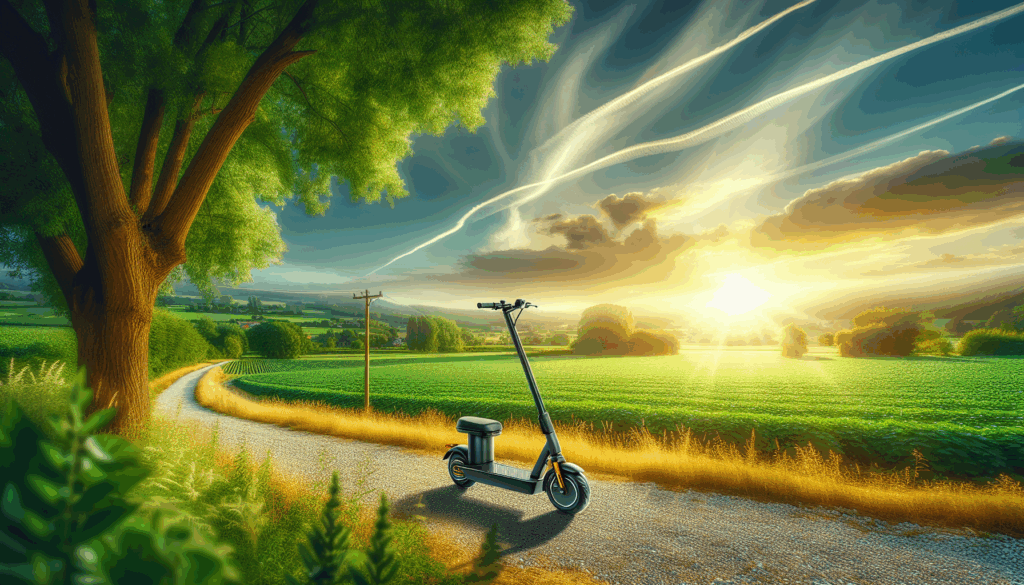
While electric scooters have become synonymous with bustling city streets and urban commuting, their versatility extends far beyond these traditional realms. From remote countryside adventures to rural delivery services, e-scooters are increasingly being recognized for their unique applications in various environments. These eco-friendly modes of transportation not only alleviate traffic congestion but also contribute to a cleaner environment, making them a valuable asset for diverse communities. With innovative uses emerging across different contexts, e-scooters provide solutions that enhance mobility, convenience, and sustainability for all.
Utility of Electric Scooters in Rural Communities
Electric scooters are not just a trend in urban environments; they hold immense potential for rural communities as well. In these areas, e-scooters can offer an efficient mode of transportation for residents who may be miles away from essential services such as grocery stores, healthcare facilities, and educational institutions. Farmers and agricultural workers can utilize e-scooters to navigate their land and quickly reach different fields or outbuildings, making daily tasks more manageable. Additionally, since many rural roads are less congested than city streets, riding an e-scooter can be an enjoyable way to experience nature while completing errands or attending community events.
Moreover, choosing e-scooters over traditional vehicles can significantly impact the environment and traffic conditions in rural areas. With lower emissions and minimal wear on roads, e-scooters provide a sustainable alternative for transportation. This eco-friendly approach can inspire a shift toward cleaner forms of mobility, contributing to local efforts to reduce carbon footprints and promote sustainability. For families, these e-scooters can serve as a practical solution for commuting to school or work, while also offering economic savings in terms of fuel and maintenance costs. Hence, e-scooters can transform transportation in rural communities, helping individuals and families thrive in their daily lives.
Electric Scooters for Delivery Services in Non-Urban Areas
Electric scooters are rapidly proving their versatility beyond the bustling urban centers, particularly in non-urban areas for delivery services. Small businesses in suburban and rural environments are increasingly adopting e-scooters as a means of delivering goods efficiently. With their compact design and ease of navigation, these e-scooters can easily traverse narrow driveways or rural paths where conventional delivery vehicles might struggle. Whether it’s delivering fresh produce from a local farm to a nearby market or bringing home-cooked meals to residents in a quaint town, e-scooters provide an eco-friendly and cost-effective alternative that benefits both businesses and customers alike.
The impact of e-scooters on delivery services is remarkable as they contribute to a significant reduction in traffic congestion and carbon emissions compared to traditional delivery methods. They offer a faster, more sustainable way to get products in the hands of consumers while preventing unnecessary wear and tear on local roads. Furthermore, by utilizing e-scooters for deliveries, companies can provide greater flexibility, reaching areas that are often overlooked by standard delivery services. This innovative use of e-scooters opens up new avenues of opportunity for local businesses and fosters greater community connections while supporting a greener environment.
Adventurous Uses: Exploring Nature Trails and Parks
Electric scooters are often associated with urban environments, but their versatility allows for exploring nature trails and parks, presenting a unique opportunity for outdoor enthusiasts. Imagine gliding smoothly through scenic park pathways, effortlessly navigating tree-lined trails, and enjoying the beauty of nature at your own pace. E-scooters are light enough to be handled on uneven terrain, making it possible to reach hidden spots that traditional vehicles can’t access. This opens up exciting experiences for families, nature lovers, and adventurers looking for an alternative way to enjoy the great outdoors while minimizing their carbon footprint, as e-scooters produce zero emissions.
Moreover, using e-scooters on nature trails can significantly reduce traffic congestion in popular recreation areas, making the experience more pleasant for everyone. Parks and nature reserves benefit from fewer vehicle emissions, preserving the integrity of the environment. Furthermore, e-scooters help individuals with mobility challenges explore vast areas of parks that may have been previously inaccessible, promoting inclusivity in outdoor adventures. Overall, e-scooters not only allow for a unique way of exploring nature but also foster a more sustainable and enjoyable outdoor experience for all.
Innovative Applications in Educational Institutions
Electric scooters are increasingly being embraced in educational institutions, showcasing their potential beyond traditional urban settings. Many colleges and universities are recognizing the benefit of electric scooters as a solution for campus mobility. Students who traverse vast campuses can use electric scooters to effortlessly go from one class to another or to get to recreational areas, significantly reducing travel time. Additionally, electric scooters can serve as a sustainable mode of transport for students, facilitating an eco-friendly lifestyle while decreasing reliance on cars, thus alleviating traffic congestion around educational facilities.
Moreover, electric scooters can also be integrated into educational programs, providing practical lessons on sustainability and technology. Schools can launch programs that involve maintenance workshops or even design challenges focused on electric scooters, engaging students in hands-on learning experiences. This innovative use not only enhances educational outcomes but also promotes a culture of environmental awareness among young people. As we continue to explore unconventional uses for electric scooters, their role in educational settings is poised to expand, offering new ways to enhance mobility, promote sustainability, and contribute to the overall campus experience.

Electric Scooters for Last-Mile Connectivity in Suburban Regions
Electric scooters have traditionally been associated with urban environments, but they are increasingly proving to be a valuable solution for last-mile connectivity in suburban regions. In areas where public transport can often be infrequent or inadequate, electric scooters offer a flexible and efficient means for residents to cover short distances—for instance, getting from a bus station to their homes, or traveling to nearby shopping centers. This unique use case extends the reach of public transit systems, allowing individuals to navigate their suburban neighborhoods with ease while reducing reliance on cars for these short trips.
The impact of electric scooters extends beyond individual convenience; they can significantly ease traffic congestion and minimize environmental impact. By providing a sustainable mode of transportation, electric scooters contribute to lowering carbon emissions in suburban areas. As more people opt for this eco-friendly alternative, we can expect to see a positive shift in traffic patterns and an enhancement in the quality of life for suburban communities, making electric scooters an essential component of modern mobility solutions.
Environmental Benefits: Reducing Carbon Footprint Outside Cities
Electric scooters are often associated with urban commuting, but their environmental benefits extend far beyond the city limits. In rural or suburban areas, electric scooters can serve as a sustainable alternative to cars for daily errands or short trips. This transition helps to reduce the carbon footprint significantly, as electric scooters emit no tailpipe emissions and require less energy compared to gas-powered vehicles. As individuals in less populated regions adopt electric scooters for travel to local shops or recreational activities, they contribute to a reduction in traffic congestion, allowing for a cleaner and quieter environment.
Moreover, by promoting electric scooter usage in diverse settings, communities can become less dependent on fossil fuels, leading to enhanced air quality and reduced noise pollution. This transition towards electric mobility can also inspire local governments to invest in more infrastructure for scooters, encouraging even more residents to consider this eco-friendly mode of transportation. The versatility of electric scooters allows them to be utilized in numerous scenarios — from farmers making quick trips to their fields to tourists exploring nature trails — showcasing that their positive environmental impact is not limited to urban areas alone.
Challenges and Solutions for Electric Scooter Use in Diverse Environments
Electric scooters have rapidly gained popularity in urban environments, but their suitability extends far beyond city streets. One of the significant challenges faced when utilizing electric scooters in diverse environments is terrain variability. Cities are frequently designed with smooth pavements; however, in rural areas or natural settings, users may encounter gravel paths or steep inclines that can make riding dangerous. To overcome this, manufacturers are innovating with electric scooters that feature rugged designs, enhanced suspension systems, and off-road capabilities. By making scooters more adaptable, they can cater to recreational users in parks, rural communities, and tourists exploring nature trails.
Moreover, a major concern regarding the environmental impact of electric scooters lies in their contribution to reducing traffic congestion and air pollution. In suburban and rural areas, electric scooters present a viable option for short trips, thus avoiding car reliance and minimizing carbon footprints. Local governments can also play a vital role by implementing dedicated bike lanes and establishing scooter-sharing programs. These solutions not only make electric scooters accessible for a broader user base but also encourage sustainable commuting practices. As we continue to explore inventive uses for electric scooters, we can create a greener and more connected world, proving that electric scooters are not merely a city gadget but tools for enhancing mobility in various settings.
The Future of Electric Scooters in Various Industries
Electric scooters are not confined to urban landscapes; their potential stretches far beyond city streets. A variety of industries are beginning to recognize the versatility of electric scooters for unique applications. For instance, in agriculture, farmers are utilizing electric scooters to navigate expansive fields quickly, reducing the need for fuel-powered vehicles that contribute to air pollution and greenhouse gas emissions. Additionally, delivery services are embracing electric scooters to navigate congested areas and to provide timely deliveries in both urban and suburban regions, thereby offsetting traffic and congestion while promoting sustainable practices. This shift not only helps businesses save on fuel costs but also aids in minimizing their carbon footprint.
The appeal of electric scooters extends to recreational uses as well, such as adventure sports or guided tours in scenic locations where traditional vehicles might not access easily. Furthermore, tourism operators are incorporating electric scooters into their offerings, allowing visitors to explore rural areas or nature trails effortlessly, thus enhancing the experience. Beyond mere transportation, electric scooters serve as a solution for last-mile connectivity, bridging the gap between public transit hubs and remote destinations. Their adaptability in diverse environments, from rural landscapes to tourist attractions, positions electric scooters as a game-changer for sustainable transport across various industries.

Embracing the Versatility of Electric Scooters
As we’ve explored throughout this blog, electric scooters offer far more than a convenient mode of transport in urban environments. Their adaptability allows individuals in rural areas and off-the-beaten-path locations to experience the joy and efficiency these vehicles bring. Whether it’s for commuting to work, running errands, or even navigating lush nature trails, electric scooters cater to a wide array of unique use cases, promoting accessibility and mobility beyond the crowded city streets.
Moreover, the impact of electric scooters extends beyond individual convenience; they significantly influence traffic reduction and environmental sustainability. By opting for electric scooters rather than traditional vehicles, people contribute to decreasing carbon emissions and easing congestion on roads. As we continue to recognize the diverse applications of electric scooters, it becomes clear that they hold the potential to transform not just how we travel, but also how we envision a greener and more sustainable future.

As a nature trail enthusiast, I think electric scooters could be a great eco-friendly option for navigating our trails. However, we need to consider safety precautions first.
Hi Wong Zi Yang, we completely agree with you about the eco-friendly aspect of electric scooters on nature trails. At Eko Life Malaysia, we prioritize safety while promoting sustainable transportation options. We’ve seen an increase in recreational users opting for electric scooters on trails with proper safety features in place. We’d love to discuss further options and best practices with you. Feel free to contact us at [email protected] or +60 3-7890 3042.
I’m all for sustainable transportation, but we need to think about the costs of these electric scooters and how they’ll benefit the general public. Who’s subsidizing these gadgets?
Hello Helen Chew, thank you for sharing your thought-provoking comment. At Eko Life Malaysia, we understand the importance of considering costs and accessibility when it comes to sustainable transportation solutions. Our electric scooters are designed to be affordable and we offer various financing options to make them more accessible to the general public. Additionally, we receive government subsidies for our eco-friendly products and services, which helps us pass the cost savings on to our customers.
I’m loving how this blog post highlights the various uses of electric scooters beyond just urban areas. It’s opening my eyes to their potential in different settings.
That’s great to hear, Siti Nur Syuhada! We’re glad you found the blog post informative and insightful. If you have any further questions or would like to know more about electric scooters, please don’t hesitate to reach out to us at [email protected] or +60 3-7890 3042. We’re always here to help. Have a great day!